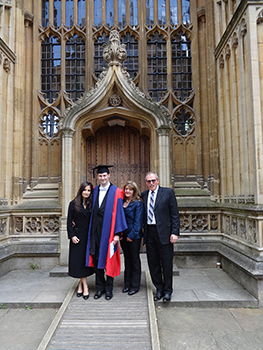Latest News Archive
Please select Category, Year, and then Month to display items
23 April 2020
|
Story Cornelius Hagenmeier
|
Photo Pixabay

The iKudu project, which is an European Union-funded Capacity Building in Higher Education (CBHE) project, has recently launched its blog, which aims to amplify the diverse voices of all iKudu stakeholders. In this space, members of the iKudu team will regularly share their views on the project and related international education topics.
The iKudu project focuses on developing a contextualised South African concept of Internationalisation of the Curriculum (IoC), which integrates Cooperative Online International Learning (COIL) virtual exchanges. The project was launched by the UFS in 2019, together with nine European and South African partner universities. It is funded by the European Union’s Erasmus+ programme with EUR999 881 (approximately R20 million) and is implemented over a three-year period.
The iKudu project is based on the fundamental belief that it is necessary to rethink internationalisation in an uncertain world. First, it is crucial to recognise and transform the power dynamics underlying international academic collaboration. Second, it is essential to develop pedagogies that allow every student to participate in international education, integrating technology where appropriate.
However, while all stakeholders agree on the fundamental tenets of the project and its principal goals, all iKudu stakeholders contribute different perspectives. In the blog, the iKudu stakeholders will provide a space for intellectual discourse on the project and related international education topics, which will allow constructive and critical engagement.
The link to the blog can be found at: https://www.ufs.ac.za/ikudu/ikudu-blogs/Transforming-Curricula-through-Internationalisation-and-Virtual-Exchanges
UFS alumnus receives PhD in Statistics from the University of Oxford
2016-06-03

In May of this year, DW Bester obtained
a DPhil in Statistics at the University of
Oxford.
Photo: Supplied
On 14 May this year, Dr DW Bester received a DPhil in Statistics from the University of Oxford. The entire ceremony, which was held in the Sheldonian Theatre in Oxford, was conducted in Latin, as has been the case for the past 800 years.
Dr Bester completed his undergraduate studies and his honours degree at the University of the Free State (UFS). “At first, I was only planning to study for a master’s degree, but was privileged to get an opportunity to do a PhD as well. I didn’t think twice!” he says.
Studies at the University of Oxford
Universities in England do not require a master’s degree for PhD studies. With the help of Prof Max Finkelstein from the UFS Department of Mathematical Statistics and Actuarial Science, Dr Bester registered for the DPhil programme in Statistics directly after his honours studies.
“The title of my thesis was: Joint survival models: A Bayesian investigation of longitudinal volatility. It dealt with a problem in the medical field to determine the cause of stroke risk: is it the absolute level of blood pressure, or the volatility thereof? The analysis of this question led to interesting models which needed advanced application techniques. I had to study these techniques and write programmes for their application.
Although Dr Bester is working currently as the technical head of a company that calculates insurance for power stations, satellites, rockets, and cyber risks, he would like to continue working with his Oxford supervisor in future to make the techniques they have developed more accessible for researchers outside of the field of statistics.
“Studying at Oxford requires hard work, perseverance, and a lot of luck. Luck plays a big role, since there are no guarantees that hard work will ensure you a spot in one of the top universities.
Regarding his studies at Oxford, Dr Bester thinks back on his exposure to the GNU/Linux operating system, and free software. “I have seen how valuable this is for analyses in practice. I also had the privilege of meeting the father of free software, Richard Stallman,” Dr Bester says.
2011 Rhodes Scholar
He was elected as Rhodes Scholar in 2011. According to Dr Bester, who has been interested in Mathematics since high school, the Rhodes scholarship was something of a fluke. He applied for the Rhodes scholarship on the recommendation of Prof Robert Schall of the Department of Mathematical Statistics and Actuarial Science.
Role of the UFS in his successes
In addition to the continued support from the team of passionate professors and lecturers at the UFS, the actuarial degree at the UFS is fraught with statistics. Emphasis is also placed on Bayesian statistics. This was crucial to his studies at Oxford. According to Dr Bester, this topic is emphasised strongly in the international statistics community.
Dr Bester regards the work done by two of his lecturers, Michael von Maltitz and Sean van der Merwe, among his highlights at the UFS. Since our first year, they have created an atmosphere of camaraderie among the students. “I think this contributed to the success of everybody. They also make an effort to present topics outside of the syllabus regularly,” says Bester.